| Listing 1 - 10 of 11 | << page >> |
Sort by
|
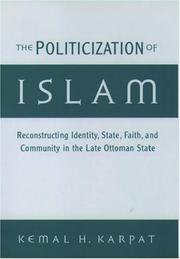
ISBN: 1280473533 0195350499 1433700220 9781433700224 9780195136180 0195136187 9780195350494 9780195185836 0195185838 0195136187 0195165438 9780195165432 0197715397 Year: 2002 Publisher: Oxford Oxford University Press
Abstract | Keywords | Export | Availability | Bookmark
 Loading...
Loading...Choose an application
- Reference Manager
- EndNote
- RefWorks (Direct export to RefWorks)
This book analyzes the transformation of the Ottoman Empire over the 19th and 20th centuries. It focuses on Muslim revivalist-fundamentalist movements which were contained by the Ottoman government's Islamist ideology and whose ideas fuelled a new kind of nationalist-religious ideology.
Islam and state --- Panislamism. --- Pan-Islamism --- Arabism --- Turkey --- History --- Islam et Etat --- Panislamisme --- Turquie --- Empire ottoman --- Histoire --- History of Southern Europe --- anno 1800-1899 --- anno 1900-1909 --- anno 1910-1919 --- anno 1920-1929
Book
ISBN: 1503611175 1503610179 1503611167 9781503611177 9781503610170 9781503611160 Year: 2020 Publisher: Stanford, California
Abstract | Keywords | Export | Availability | Bookmark
 Loading...
Loading...Choose an application
- Reference Manager
- EndNote
- RefWorks (Direct export to RefWorks)
At the turn of the twentieth century, thousands of Central Asians made the annual pilgrimage to Mecca. Traveling long distances, many lived for extended periods in Ottoman cities dotting the routes. Though technically foreigners, these Muslim colonial subjects often blurred the lines between pilgrims and migrants. Not quite Ottoman, and not quite foreign, Central Asians became the sultan's spiritual subjects. Their status was continually negotiated by Ottoman statesmen as attempts to exclude foreign Muslim nationals from the body politic were compromised by a changing international legal order and the caliphate's ecumenical claims. Spiritual Subjects examines the paradoxes of nationality reform and pan-Islamic politics in late Ottoman history. Lâle Can unravels how imperial belonging was wrapped up in deeply symbolic instantiations of religion, as well as prosaic acts and experiences that paved the way to integration into Ottoman communities. A complex system of belonging emerged—one where it was possible for a Muslim to be both, by law, a foreigner and a subject of the Ottoman sultan-caliph. This panoramic story informs broader transregional and global developments, with important implications for how we make sense of subjecthood in the last Muslim empire and the legacy of religion in the Turkish Republic.
Muslim pilgrims and pilgrimages --- History. --- Caliphate. --- Central Asia. --- Ottoman Empire. --- Sufism. --- extraterritoriality. --- hajj pilgrimage. --- nationality reform. --- pan-Islamism. --- protection. --- transimperial. --- Islamic pilgrims and pilgrimages --- Pilgrims and pilgrimages, Muslim --- Muslim travelers --- Pilgrims and pilgrimages --- Turkey --- History --- Ottoman Empire, 1288-1918
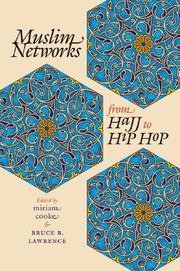
ISBN: 0807876313 9780807876312 0807829234 9780807829233 080785588X 9780807855881 9798890879332 Year: 2005 Publisher: Chapel Hill University of North Carolina Press
Abstract | Keywords | Export | Availability | Bookmark
 Loading...
Loading...Choose an application
- Reference Manager
- EndNote
- RefWorks (Direct export to RefWorks)
This volume selects major moments and key players from the seventh century to the twenty-first that have defined Muslim networks as the building blocks for Islamic identity and social cohesion. The essays provide a long view of Muslim networks, correcting both scholarly omission and political sloganeering.
Islam. --- Panislamism. --- Ummah (Islam). --- Social Science. --- Religion. --- Islam --- Panislamism --- Ummah (Islam) --- #SBIB:054.AANKOOP --- #SBIB:316.331H421 --- #SBIB:316.7C130 --- Umma (Islam) --- Islam and state --- Pan-Islamism --- Arabism --- Mohammedanism --- Muhammadanism --- Muslimism --- Mussulmanism --- Religions --- Muslims --- Computer network resources --- Morfologie van de godsdiensten: Islam --- Groepscultuur en subculturen --- Islam - 21st century --- Islam - Computer network resources
Book
ISBN: 0674737067 0674737040 9780674737044 9780674088702 0674088700 Year: 2015 Publisher: Cambridge, MA
Abstract | Keywords | Export | Availability | Bookmark
 Loading...
Loading...Choose an application
- Reference Manager
- EndNote
- RefWorks (Direct export to RefWorks)
In this dialogue between a famous atheist and a former radical, Sam Harris and Maajid Nawaz invite you to join an urgently needed conversation: Is Islam a religion of peace or war? Is it amenable to reform? Why do so many Muslims seem drawn to extremism? The authors demonstrate how two people with very different views can find common ground.
Toleration --- Dialogue --- Religious aspects --- Islam. --- Religious aspects. --- 9/11. --- al qaeda. --- anti muslim sentiment. --- counter extremism strategy. --- debate. --- fighting prejudice. --- hizb ut tahrir. --- how combat extremism. --- isis. --- islamic state. --- islamophobia. --- muslim brotherhood. --- muslim identity crisis. --- pan islamism. --- quran. --- radicalization. --- religious scripture. --- september 11. --- sharia law. --- terrorism.
Book
ISBN: 902471334X 9004286926 9789004286924 9789024713349 Year: 1972 Publisher: Brill
Abstract | Keywords | Export | Availability | Bookmark
 Loading...
Loading...Choose an application
- Reference Manager
- EndNote
- RefWorks (Direct export to RefWorks)
This title addresses the Khilafat Movement in India, a pan-Islamic, political protest campaign launched by Muslims of India to influence the British government not to abolish the Ottoman Caliphate.
Muslims --- Panislamism --- Musulmans --- Panislamisme --- India --- Inde --- Politics and government --- Politique et gouvernement --- Regions & Countries - Asia & the Middle East --- History & Archaeology --- South Asia --- Panislamism. --- Muslims. --- Politics and government. --- 1919 - 1947 --- India. --- Pan-Islamism --- Arabism --- Mohammedans --- Moors (People) --- Moslems --- Muhammadans --- Musalmans --- Mussalmans --- Mussulmans --- Mussulmen --- Religious adherents --- Islam --- Muslims in India --- Bharat --- Bhārata --- Government of India --- Ḣindiston Respublikasi --- Indi --- Indien --- Indii͡ --- Indland --- Indo --- Republic of India --- Sāthāranarat ʻIndīa --- Yin-tu --- indonesia --- Caliphate --- Hinduism --- Islam in India --- Khilafat Movement --- Turkey
Book
ISBN: 0691199647 Year: 2020 Publisher: Princeton, NJ : Princeton University Press,
Abstract | Keywords | Export | Availability | Bookmark
 Loading...
Loading...Choose an application
- Reference Manager
- EndNote
- RefWorks (Direct export to RefWorks)
A compelling history of the ancient schism that continues to divide the Islamic worldWhen Mohammed died in 632 without a male heir, Sunnis contended that the choice of a successor should fall to his closest companions, but Shi'a believed that God had inspired the Prophet to appoint his cousin and son-in-law, Ali, as leader. So began a schism that is nearly as old as Islam itself. Laurence Louër tells the story of this centuries-old rivalry, taking readers from the last days of Mohammed to the political and doctrinal clashes of Sunnis and Shi'a today.In a sweeping historical narrative spanning the Islamic world, Louër shows how the Sunni-Shi'a divide was never just a dispute over succession-at issue are questions about the very nature of Islamic political authority. She challenges the widespread perception of Sunnis and Shi'a as bitter enemies who are perpetually at war with each other, demonstrating how they have coexisted peacefully at various periods throughout the history of Islam. Louër traces how sectarian tensions have been enflamed or calmed depending on the political contingencies of the moment, whether to consolidate the rule of elites, assert clerical control over the state, or defy the powers that be.Timely and provocative, Sunnis and Shi'a provides needed perspective on the historical roots of today's conflicts and reveals how both branches of Islam have influenced and emulated each other in unexpected ways. This compelling and accessible book also examines the diverse regional contexts of the Sunni-Shi'a divide, examining how it has shaped societies and politics in countries such as Iraq, Pakistan, Saudi Arabia, Iran, Yemen, and Lebanon.
Islam --- Doctrines. --- Abu Bakr al-Baghdadi. --- Al-Qaeda. --- Arab Spring. --- Arab uprisings. --- Arab-Israeli conflict. --- Beyond Sunni and Shia. --- Danny Postel. --- Fatah. --- Frederic Wehrey. --- Gamal Nasser. --- Gaza. --- Geneive Abdo. --- Hamas. --- Hosni Mubarak. --- ISIS. --- Intefada. --- Islamists. --- Jabal Amel. --- Mohamed Morsi. --- Muhammad Qutb. --- Nader Hashemi. --- Nader Shah. --- Osama bin Laden. --- Palestinians. --- Pan-Islamism. --- Saddam Hussein. --- Sayyid Qutb. --- Sectarianization. --- September 11. --- Shah of Iran. --- The New Sectarianism. --- World Trade Center. --- caliphate. --- sectarianism. --- the Islamic State.
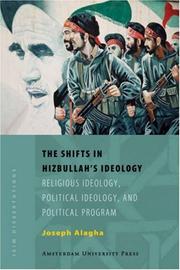
ISBN: 9789053569108 9053569103 9786610958375 9048504422 1280958375 1423785347 9781423785347 9789048504428 9781280958373 Year: 2006 Publisher: Amsterdam
Abstract | Keywords | Export | Availability | Bookmark
 Loading...
Loading...Choose an application
- Reference Manager
- EndNote
- RefWorks (Direct export to RefWorks)
Analyses of the political and ideological transformation of Hizbullah
Political parties --- Islam and politics --- Islam and state --- Partis politiques --- Islam et politique --- Islam et Etat --- Hizballah (Lebanon) --- Lebanon --- Liban --- Politics and government --- Politique et gouvernement --- Islam and politics. --- Government - Non-U.S. --- Law, Politics & Government --- Government - Asia --- Shiites --- Shia Muslims --- Shiah Muslims --- Shiahs --- Shias --- Shiite Muslims --- Ḥizb Allāh (Lebanon) --- Hezbollah (Lebanon) --- Hizbollah (Lebanon) --- Mifleget ha-El (Lebanon) --- Hizbullah (Lebanon) --- Hezbullah (Lebanon) --- חזבאללה --- חיזבאללה --- حزب الله --- حزب الله (لبنان) --- حزب الله (Lebanon) --- Hezballah (Lebanon) --- Muslims --- martyrdom --- wetenschap algemeen --- hizbullah's ideology --- islamic state --- israel and us --- integration (infitah) --- interest (maslaha) --- oppressors and oppressed --- pan-islamism --- anti-imperialism --- popular science --- greater and smaller jihad
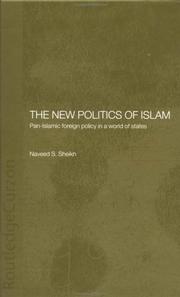
ISBN: 0700715924 1135789762 1280070536 0203220331 9780203220337 9780700715923 9781135789763 9781280070532 9781135789718 9781135789756 9780415444538 1135789754 Year: 2003 Publisher: London New York RoutledgeCurzon
Abstract | Keywords | Export | Availability | Bookmark
 Loading...
Loading...Choose an application
- Reference Manager
- EndNote
- RefWorks (Direct export to RefWorks)
This text examines how Islam is to be understood in relation to contemporary international relations. It highlights salient characteristics in pan-Islamic theory and its implications.
Panislamism. --- Islam and politics --- Islam and international relations --- Panislamisme --- Islam et politique --- Islam et relations internationales --- Organisation of Islamic Conference --- Islamic countries --- Pays musulmans --- Politics and government. --- Politique et gouvernement --- Panislamism --- Politics and government --- Organisation of Islamic Conference. --- Pan-Islamism --- Islamic Conference Organisation --- Organisation of the Islamic Conference --- Organisasi Konperensi Islam --- Organization of the Islamic Conference --- Munaẓẓamat al-Muʼtamar al-Islāmī --- OIC (Organization) --- O.I.C. (Organization) --- Organisation de la Conférence islamique --- İslâm Konferansı Teşkilatı --- Pertubuhan Persidangan Islam --- Organisation der Islamischen Konferenz --- Organization of Islamic Conference --- OCI (Organization) --- Sāzmān-i Kunfirāns-i Islāmī --- منظمة المؤتمر الاسلامي --- OKI (Organization) --- Organizat︠s︡ii︠a︡ Islamskai︠a︡ Konferent︠s︡ii︠a︡ --- OIK (Organization) --- Arabism --- Organisation of Islamic Cooperation --- Islam and politics - Islamic countries --- Islamic countries - Politics and government
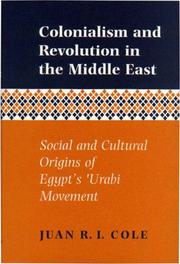
ISBN: 1282457764 9786612457760 1400820901 1400811279 9781400811274 9781400820900 9780691056838 0691056838 140080132X Year: 1993 Publisher: Princeton, N.J. Princeton University Press
Abstract | Keywords | Export | Availability | Bookmark
 Loading...
Loading...Choose an application
- Reference Manager
- EndNote
- RefWorks (Direct export to RefWorks)
In this book Juan R. I. Cole challenges traditional elite-centered conceptions of the conflict that led to the British occupation of Egypt in September 1882. For a year before the British intervened, Egypt's viceregal government and the country's influential European community had been locked in a struggle with the nationalist supporters of General Ahmad al-`Urabi. Although most Western observers still see the `Urabi movement as a "revolt" of junior military officers with only limited support among the Egyptian people, Cole maintains that it was a broadly based social revolution hardly underway when it was cut off by the British. While arguing this fresh point of view, he also proposes a theory of revolutions against informal or neocolonial empires, drawing parallels between Egypt in 1882, the Boxer Rebellion in China, and the Islamic Revolution in modern Iran. In a thorough examination of the changing Egyptian political culture from 1858 through the `Urabi episode, Cole shows how various social strata--urban guilds, the intelligentsia, and village notables--became "revolutionary." Addressing issues raised by such scholars as Barrington Moore and Theda Skocpol, his book combines four complementary approaches: social structure and its socioeconomic context, organization, ideology, and the ways in which unexpected conjunctures of events help drive a revolution.
Social classes --- Class distinction --- Classes, Social --- Rank --- Caste --- Estates (Social orders) --- Social status --- Class consciousness --- Classism --- Social stratification --- History --- ʻUrābī, Aḥmad, --- Egypt --- Aḥmad ʻArābī, --- Aḥmad ʻIrābī, --- Aḥmad ʻUrābī, --- ʻArābī, Aḥmad, --- ʻArabi Pasha, --- ʻIrābī, Aḥmad, --- Ourabi, Ahmad, --- Ourabi, Ahmed, --- ʻUrābī Pasha, --- أحمد عرابي --- عرابي، أحمد، --- عرابي، احمد --- عرابي، احمد، --- عرابى، أحمد، --- History of Africa --- anno 1800-1899 --- Abbasid Caliphate. --- Activism. --- Al-Ahram. --- Al-Mahdi. --- Algerian War. --- Ancien Régime. --- Anti-imperialism. --- Arabization. --- Banditry. --- Before the Revolution. --- Bourgeoisie. --- British Empire. --- Bureaucrat. --- Byzantine Empire. --- Caliphate. --- Capitalism. --- Censorship. --- Central Asia. --- Circassians. --- Colonialism. --- Conspiracy theory. --- Constitutionalist (UK). --- Corporatism. --- Counter-revolutionary. --- Decolonization. --- Despotism. --- Economic interventionism. --- Education in Egypt. --- Egyptian Government. --- Egyptian crisis (2011–14). --- Egyptian law. --- Egyptians. --- Elie Kedourie. --- Emir. --- English Revolution. --- Expansionism. --- Expatriate. --- Extraterritoriality. --- Foreign policy of the United States. --- From Time Immemorial. --- Ideology. --- Imperial Ambitions. --- Imperialism. --- Indian Rebellion of 1857. --- Infant industry. --- Insurgency. --- Intelligentsia. --- International relations. --- Iranian Revolution. --- Jamal ad-Din al-Afghani. --- Jingoism. --- Khedive. --- Labor aristocracy. --- Liberalism (book). --- Liberalism. --- Loan shark. --- Mercantilism. --- Middle East. --- Mirrors for princes. --- Nativism (politics). --- Neocolonialism. --- New Political Economy (journal). --- Newspaper. --- On Revolution. --- Orientalism. --- Ottoman Empire. --- Pan-Islamism. --- Peasant. --- Pogrom. --- Political revolution. --- Politics. --- Poll tax. --- Populism. --- Radicalism (historical). --- Reformism. --- Revolution. --- Revolutionary movement. --- Ruhollah Khomeini. --- Salman Rushdie. --- Sayyid. --- Secularization. --- Social revolution. --- State within a state. --- States and Social Revolutions. --- Subaltern (postcolonialism). --- Suez Canal Company. --- Suez Crisis. --- Tanzimat. --- Tax collector. --- Tax. --- The Imperialism of Free Trade. --- Tyrant. --- Upper Egypt. --- Urban riots. --- Use tax. --- Usury. --- Warfare. --- Westernization. --- Young Turk Revolution. --- Zoroaster. --- Urabi, Ahmad,
Book
ISBN: 1400890071 9781400890071 Year: 2018 Publisher: Princeton, NJ
Abstract | Keywords | Export | Availability | Bookmark
 Loading...
Loading...Choose an application
- Reference Manager
- EndNote
- RefWorks (Direct export to RefWorks)
How the conflict between political Islamists and secular-leaning nationalists has shaped the history of the modern Middle EastIn 2013, just two years after the popular overthrow of Hosni Mubarak, the Egyptian military ousted the country's first democratically elected president-Mohamed Morsi of the Muslim Brotherhood-and subsequently led a brutal repression of the Islamist group. These bloody events echoed an older political rift in Egypt and the Middle East: the splitting of nationalists and Islamists during the rule of Egyptian president and Arab nationalist leader Gamal Abdel Nasser. In Making the Arab World, Fawaz Gerges, one of the world's leading authorities on the Middle East, tells how the clash between pan-Arab nationalism and pan-Islamism has shaped the history of the region from the 1920s to the present.Gerges tells this story through an unprecedented dual biography of Nasser and another of the twentieth-century Arab world's most influential figures-Sayyid Qutb, a leading member of the Muslim Brotherhood and the father of many branches of radical political Islam. Their deeply intertwined lives embody and dramatize the divide between Arabism and Islamism. Yet, as Gerges shows, beyond the ideological and existential rhetoric, this is a struggle over the state, its role, and its power.Based on a decade of research, including in-depth interviews with many leading figures in the story, Making the Arab World is essential reading for anyone who wants to understand the roots of the turmoil engulfing the Middle East, from civil wars to the rise of Al-Qaeda and ISIS.
Arab nationalism
---
Islamic fundamentalism
---
HISTORY / Middle East / General.
---
Middle East
---
history
---
political Islam
---
religious fundamentalism
---
Arab world
---
Arabs
---
Nationalism
---
Politics and government
---
Nasser, Gamal Abdel,
---
Quṭb, Sayyid,
---
ʻAbd-an-Nāṣir, Ǧamāl
---
Quṭb, Saiyid
---
Muslimbruderschaft
---
Since 1945
---
Egypt
---
Egypt.
---
Middle East.
---
Ägypten
---
Arabische Staaten
---
Arab world.
---
Quṭb, Saijid
---
Qutb, Sajjed
---
Qutb, Sayed
---
Qutb, Sayyed
---
Quṭb, Sayyid
---
Qutb, Sayyid
---
Qutb, Seyyid
---
Qutb, Syed
---
Quthub, Sayyid
---
Qutub, Säyyid <<Šehit>>
---
Qutup, Säyyid <<Šähid>>
---
Qutup, Säyyid
---
Qudub, Sayid
---
Qotb, Sayed
---
Ibn-Ibrāhīm, Saiyid Ibn-Quṭb
---
Ibrāhīm, Saiyid Quṭb
---
Kotb, Sayed
---
Kutub, Seyyid
---
Sāḏilī, Sayyid Quṭb Ibrāhīm Ḥusayn
---
Šähid Säyyid Qutup
---
Saiyid Quṭb Ibrāhīm
---
Saijid Quṭb
---
Sayed Kotb
---
Sayid Qudub
---
Sayyid Quṭb
---
Šehit Säyyid Qutub
---
Seyyid Kutub
---
قۇتۇب, سەييىد <<شېھىت>>
---
قۇتۇپ, سەييىد <<شەھىد>>
---
شەھىد سەييىد قۇتۇپ
---
Journalist
---
Quṭb, Muḥammad
---
1906-1966
---
10.09.1906-29.08.1966
---
Abd An-Nasir, Gamal
---
ʿAbd an-Nasir, Gamal
---
Abdul Nasser, Gamal
---
ʿAbd an-Nāṣir, Jamāl
---
Abd-el-Nasser, Gamal
---
Nāṣir, Ğamāl ʿAbd- <
| Listing 1 - 10 of 11 | << page >> |
Sort by
|

 Search
Search Feedback
Feedback About UniCat
About UniCat  Help
Help News
News